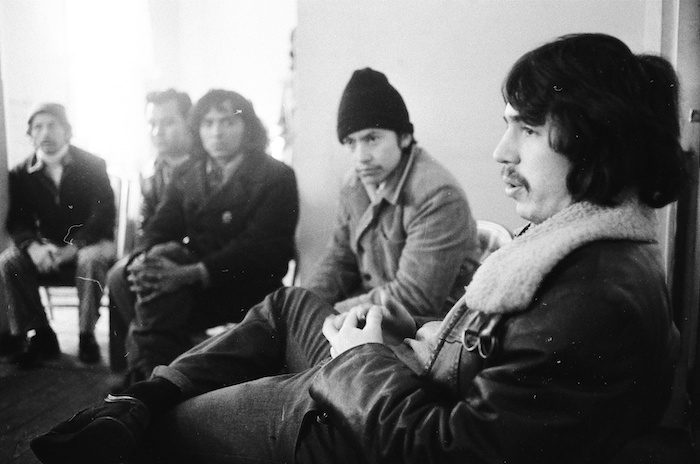
Rudy Lozano (foreground) at a Center for Autonomous Social Action meeting in 1975. ST-40001425-0011, Chicago Sun-Times collection, CHM
On July 17, 1951, Mexican American political activist Rudy Lozano was born in Harlingen, Texas. Lozano and his family moved to Chicago in the early 1950s, and he spent his formative years in the Pilsen neighborhood on the near Southwest Side. Lozano’s activism began as a student at Carter Henry Harrison Technical High School (now Maria Saucedo Scholastic Academy), where he organized a walkout to protest poor school facilities and the lack of Latino representation in the curriculum.
After attending the University of Illinois Chicago, Lozano became a part of the group Centro de Acción Social Autónoma, Hermanedad General de Trabajadores (Center for Autonomous Social Action, General Brotherhood of Workers, or CASA). CASA worked to unionize noncitizen workers and provided them with welfare services and education to better know their rights as employees. Lozano also became the Midwest director of the International Ladies’ Garment Workers Union. His political work began in the Southwest Side’s 22nd Ward, where he registered Latine voters and tried to build unity between Latino and Black communities as he campaigned for Harold Washington, Chicago’s first African American mayor.
Lozano’s life was cut short on June 8, 1983, when he was murdered in his home. His memory lives on through the work of his sister, Emma, who created Pueblo Sin Fronteras (People Without Borders), an immigrant rights group, and in the Latino community in Chicago. The Rudy Lozano branch of the Chicago Public Library is located today in the Pilsen neighborhood.
Read more about Rudy Lozano at Digital Chicago History.
Made possible by a grant from the Andrew W. Mellon Foundation, Digital Chicago History is a CHM website that showcases Lake Forest College’s Digital Chicago: Unearthing History and Culture project, a collection of multidisciplinary student and faculty research on Chicago’s history that explores diverse topics, such as music of the 1893 World’s Columbian Exposition and the history of Haitian churches in Chicago, as well as student intern research conducted at CHM on the history of race in Chicago as part of the Humanities 2020 initiative. See all of these projects.